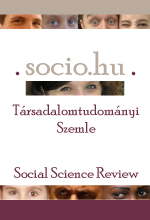Social farming as a means of poverty reduction in rural Hungary
Social farming as a means of poverty reduction in rural Hungary
Author(s): Ildikó Asztalos MorellSubject(s): Social differentiation, Human Ecology, Rural and urban sociology, Sociology of Culture
Published by: MTA TK Szociológiai Intézet
Keywords: food poverty; community development; workfare; social farming
Summary/Abstract: This paper is to set focus on innovative ways to combat food poverty in rural Hungary. Food poverty is associated with malnutrition which can refer both to the lack of food and its dissatisfying quality. Food poverty in the post-socialist rural context does not emerge as a consequence of natural catastrophes or lacking accessibility to food. Rather, it is the outcome of the unequal distribution of incomes and resources. Methods of overcoming food-poverty emerge primarily in the interplay between post-socialist welfare institutions and civil society initiatives, even if market agents occupy an increasing role in neo-neoliberal regimes as donators of charity and resources or as collaborators in poverty alleviation projects. Municipalities work within the paradigms of the welfare state and its social benefit system as redistributors of state resources, in contrast civil society agents represent partial interests and work from principles independent of the state redistributive logic. Therefore, it is of interest to explore in which way poverty relief programmes put emphasis on the importance of community development and participation of marginalized groups in the development of individual and group resources necessary for overcoming their exclusion. The paper explores municipality versus civil organization approaches along the dimensions of agency; whether and if so in which way these social food projects worked for the empowerment of marginalized groups. In this pursuit I focus on immaterial aspects of empowerment, where, as argued above, the development of social resources constitutes a central role. Furthermore, the paper explores the differences and potential synergies between municipality and civil organization based social agriculture projects aiming to combat marginalization welfare dependency.
Journal: Socio.hu Társadalomtudományi Szemle
- Issue Year: 5/2015
- Issue No: Spec 3
- Page Range: 83-106
- Page Count: 24
- Language: English

